The Impact of AI on Software Development: Automating the Future
-
Caploitte
-
15 Nov 2024
-
09 Min Read
The Role of AI in Modern Software Development
Improving Development Cycles and Team Productivity
How AI is Enhancing Software Security?
The Human Element in AI-Augmented Software Development
Conclusion
AI has changed the software development industry by improving and automating tasks. AI technologies facilitate faster and more effective development work by automating tasks like testing and code production. This change decreases human mistakes and saves time. This shift is being driven by AI tools that accelerate development and make code simpler, such as GitHub Copilot and OpenAI Codex.
Better quality and faster delivery are necessary for modern software. AI can help with this, providing automated testing, stronger security protocols, and predictive analytics. The way developers approach the whole development lifecycle is beginning to change as a result of AI. In this article, we will discuss how artificial intelligence is transforming the software development process. We’ll talk about how it affects important areas like future trends and code generation, testing, and deployment. Now let’s get going!
The Role of AI in Modern Software Development
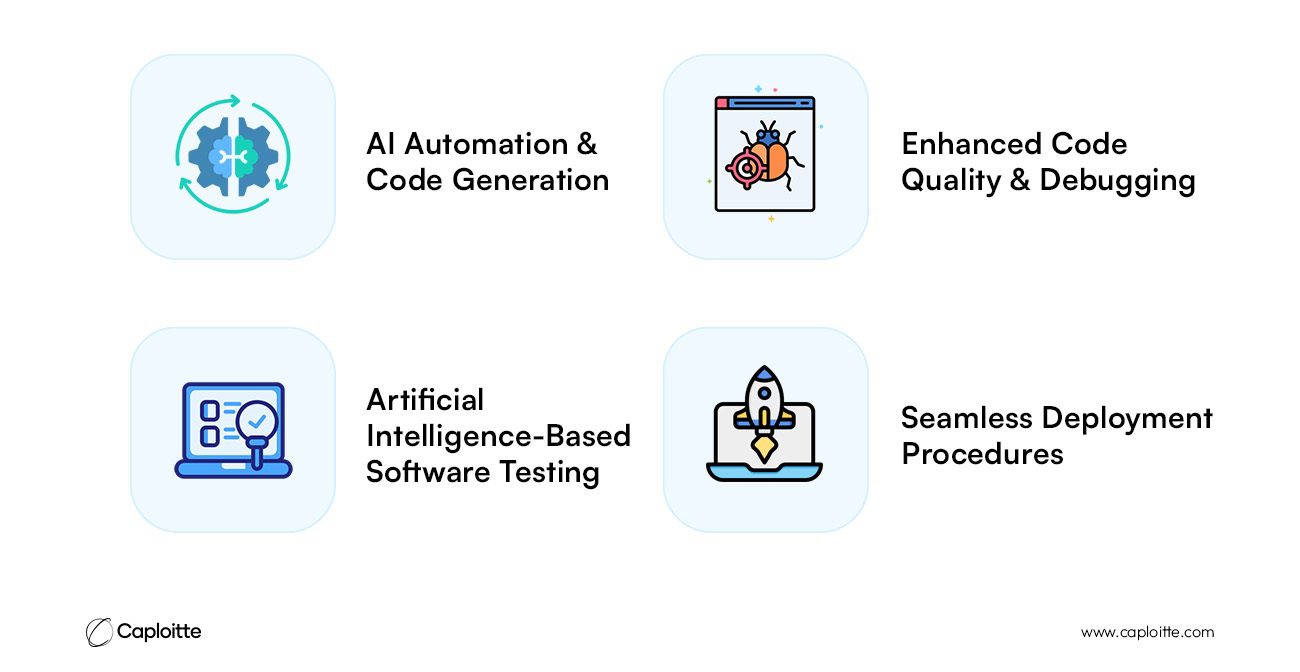
Artificial Intelligence (AI) is changing how software is built. Jobs that took hours to complete now get done much more quickly. AI tools can be used by developers to automate security, testing, and coding procedures. It enables them to concentrate on harder assignments. Delivering software that is better, quicker, and more secure now increasingly depends on AI. It guarantees excellent outcomes, streamlines processes, and increases productivity.
AI Automation and Code Generation
The process of coding has been revolutionized by AI technologies such as OpenAI Codex and GitHub Copilot. These programs construct entire functions and even suggest possible lines of code. As a result, engineers spend less time manually coding. It enables them to concentrate on resolving more complex and imaginative problems. To determine the optimal ways to develop code, AI tools often examine chronological data. Consequently, organizations may guarantee superior quality standards and expedite project completion.
Moreover, artificial Intelligence reduces human error by automating these operations. This ensures software delivery on time and accelerates development. AI has shown to be a game-changer for increasing the effectiveness and caliber of coding.
Enhanced Code Quality and Debugging
AI has simplified code debugging. Large volumes of code can be automatically scanned for mistakes using tools like DeepCode. This aids developers in resolving issues before they worsen. Real-time recommendations for writing cleaner code are provided by AI algorithms. As a result, software becomes more dependable and makes fewer errors.
Additionally, these AI tools monitor performance and offer suggestions for enhancements. Software becomes more user-friendly and safe as a result. By automating error detection, developers can concentrate on the larger picture and make sure the product functions as intended.
Artificial Intelligence-Based Software Testing
Software testing is now far more productive thanks to AI. It manages user acceptability testing, unit testing, and integration testing more quickly and accurately. Developers can avoid wasting time on tedious activities by doing this. DeepCode and other AI algorithms can find bugs more quickly than manual testing techniques. Faster bug patches and higher-caliber software result from this.
- AI makes sure every section of the code is tested. This guarantees software quality and lowers the possibility of overlooked errors.
- Teams can focus more of their time on critical tasks when AI manages repetitious testing.
- Patterns and mistakes that human testers might overlook are detected by AI systems. Software becomes more dependable as a result.
Seamless Deployment Procedures
The use of AI has revolutionized software deployment. Numerous manual tasks are now automated by it. This decreases errors and speeds up the procedure. Because AI automates the integration of code into production, CI/CD systems operate more quickly. As a result, there is less downtime and quicker releases.
- AI lessens human mistakes during deployment, improving the efficiency and dependability of the procedure.
- Following software deployment, AI tools keep an eye on it. This helps teams identify and address problems before they become serious ones.
Improving Development Cycles and Team Productivity
Streamlining the Process of Development
The entire software development cycle is accelerated with AI. AI frees engineers to work on more crucial jobs by automating processes like testing and code development. Shorter project schedules and quicker deliverables are the outcome of this. AI also speeds up feedback loops, enabling teams to recognize issues and take swift action. By doing this, projects are kept on schedule.
Predictive analytics is yet another potent AI capability. It assists teams in identifying possible delays in advance. AI examines data from previous projects to identify potential problem areas. It also offers solutions to address issues before they become disruptive. This proactive strategy guarantees seamless project completion and maintains team productivity.
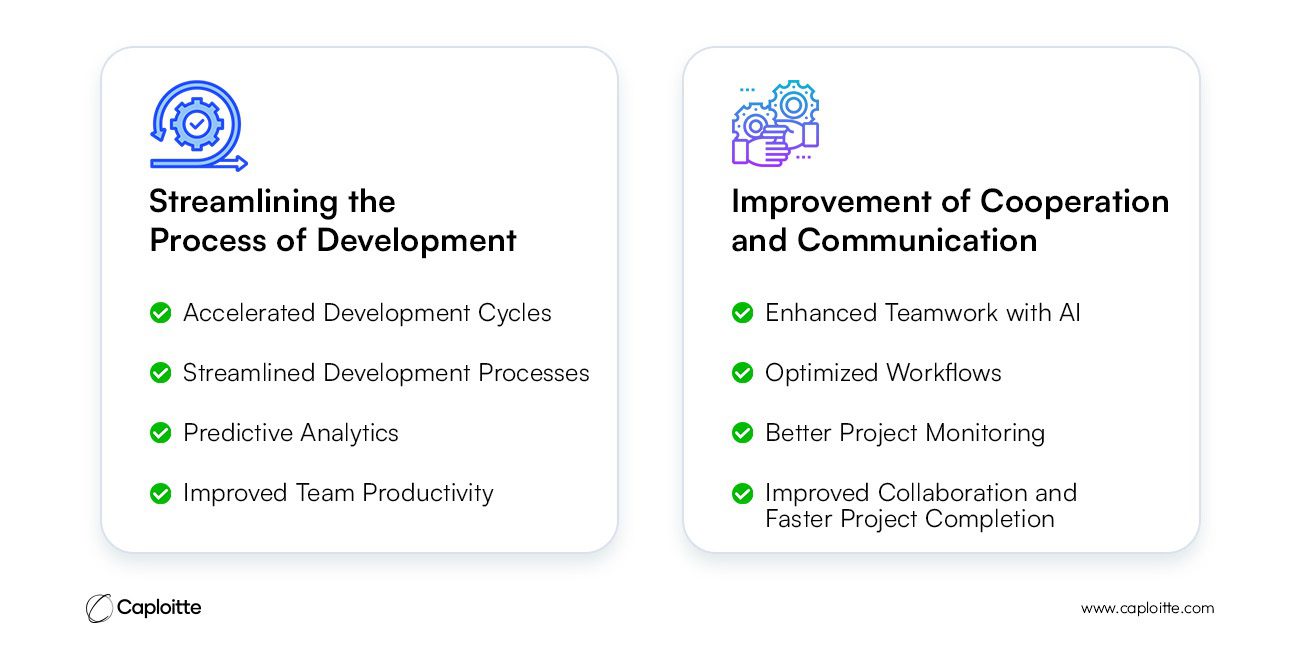
Improvement of Cooperation and Communication
AI also facilitates improved teamwork. Artificial Intelligence enhances teamwork in both in-person and remote work scenarios. AI-powered solutions that send out real-time project updates and status reports facilitate collaboration. This eliminates the need for ongoing meetings by keeping everyone in the loop.
AI systems can also recommend workflows based on the unique requirements of each team. Project managers are better able to monitor progress and make decisions as a result. As a result, collaboration is improved, projects are completed more quickly, and results are more successful.
How AI is Enhancing Software Security?
Software security is being revolutionized by AI since it can detect threats and weaknesses in real time. It continuously monitors systems using machine learning to spot anomalous trends that might indicate security threats. AI tools are able to automatically react to cyberattacks, separating threats before they have a significant negative impact. Furthermore, by reducing human error, providing round-the-clock monitoring, and assisting in the prevention of data breaches, AI-powered solutions improve security standards.
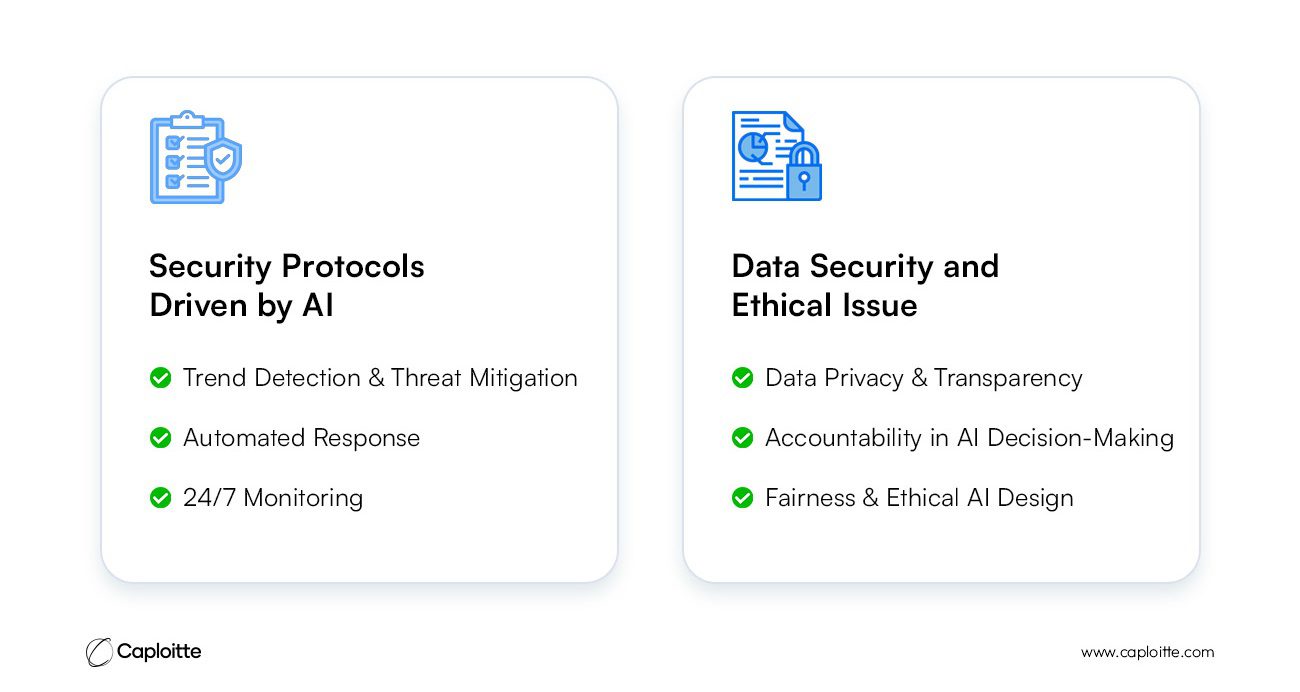
Security Protocols Driven by AI
AI plays a key role in enhancing software security. Real-time security vulnerability detection is possible with AI tools. Algorithms for machine learning continuously observe systems. By utilizing data, they may anticipate and avert risks before they arise. The prevention of cyberattacks depends on this real-time detection.
- AI algorithms examine data to identify trends and security threats. This enables developers to address problems prior to their exploitation.
- Artificial Intelligence has the capability to react to cyberattacks in an automated manner. It lessens the effect of security breaches by isolating questionable behavior and halting additional harm.
- To provide ongoing protection, AI systems offer monitoring around the clock. This protects sensitive data and lessens the possibility of unwanted access.
Data Security and Ethical Issue
AI increases security, but it also raises ethical and data privacy issues. AI systems frequently handle private user information. Businesses must make sure that the information they gather and utilize is accountable for and transparent.
- AI processes vast volumes of data, some of which contain private data. To protect users, businesses need to have stringent privacy rules. Transparency in the collection and use of data is essential.
- AI systems must be accountable for their decisions. When AI judgments have an impact on consumers, developers and organizations need to be able to explain the decision-making process.
- It’s critical to guarantee that AI systems are impartial and equitable. In order to comply with legislation and gain users’ trust, developers need to design moral systems.
The Human Element in AI-Augmented Software Development
AI is becoming a useful tool in software development as it develops further. But the human factor is still very important. While AI is capable of handling repetitive jobs and data analysis, it is not a perfect substitute for human creativity or intuition. Developers ensure that software solutions match customer needs by bringing innovation and problem-solving skills to projects. AI and humans working together enables more effective development without sacrificing the vital human touch.
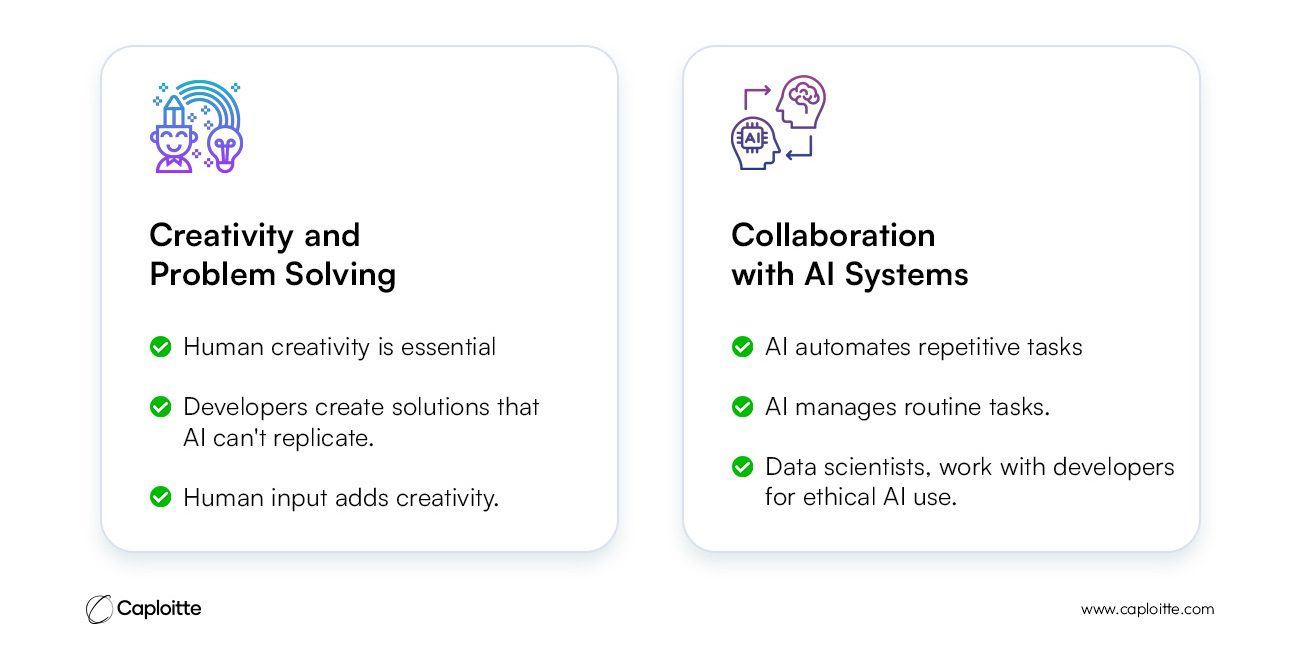
Creativity and Problem Solving
Even if AI is very good at automating activities, human creativity is still necessary to solve complicated challenges. By thinking creatively, developers are able to create solutions that AI is unable to. AI is data-driven and pattern-driven; unlike humans, however, it is not creative or emotionally intelligent. Another important factor in creating user-friendly software is developers. They are able to produce user-centered, intuitive designs that AI cannot fully imitate. Artificial intelligence (AI) expedites progress, while human input guarantees customized, creative, and practical solutions.
Collaboration with AI Systems
AI improves development by handling repetitive chores so that developers can concentrate on more difficult problems. AI makes developers more productive rather than replacing them. AI takes care of tasks like testing, code development, and issue discovery, freeing up developers to make more strategic decisions. New positions like data scientists and AI engineers are growing as AI is incorporated into development more and more. These experts work in tandem with conventional developers to guarantee the moral and efficient application of AI.
Future Trends and the Evolving Landscape of AI in Software Development
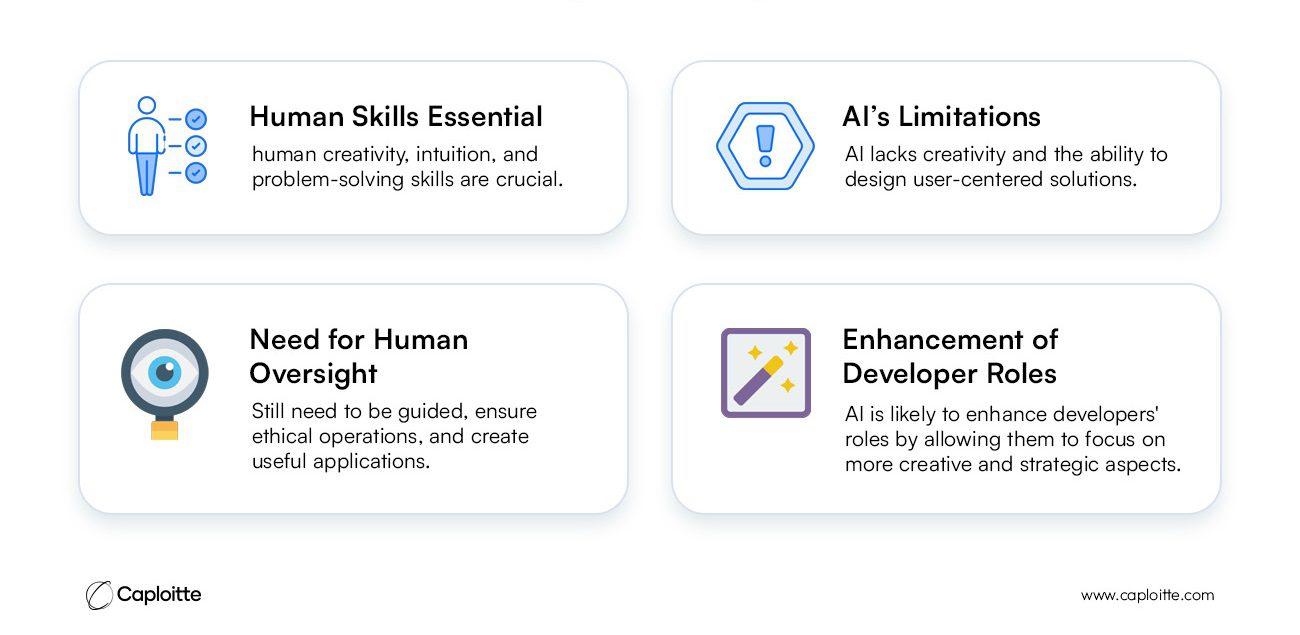
The field of software development is constantly changing due to artificial intelligence (AI). New trends in technology are influencing software development and how developers work. These developments are changing not just the jobs people do, but also the underlying technologies and moral issues in software engineering. We will look at five major trends influencing AI-driven software development going forward in this part.
1. AI’s Impact on Job Roles
The worry that AI will result in job displacement is one of the main worries. There are concerns that developers can lose their employment as AI replaces monotonous chores like testing and code development. The reality is more nuanced, though. AI is creating new professions in software development in addition to automating some tasks. Machine learning professionals, data scientists, and AI engineers are among the increasingly important positions. Additionally, developers are adjusting by picking up new techniques to collaborate with AI rather than oppose it in their workflows.
The need for human knowledge to supervise, direct, and guarantee the moral application of AI is still very much in demand. In this changing environment, developers who embrace AI and learn to work with it will prosper, striking a balance between the efficiency of AI and the necessity for human ingenuity.
2. AI’s Role in Cloud Computing, IoT, and Edge Computing
The Internet of Things (IoT), edge computing, and cloud computing are all being impacted by artificial intelligence (AI) more and more. These technological advancements are essential for managing the enormous volumes of data produced by cloud-based and smart device systems. Cloud infrastructure performance is being optimized by AI-driven solutions, which also assist with data management, security, and scalability. AI in IoT enables faster decision-making and more effective data processing, particularly in real-time applications like smart cities and driverless cars.
AI is also essential in edge computing, which processes data closer to the source instead of sending it to centralized data centers. AI enables edge devices to securely and swiftly handle data, which makes them perfect for applications like industrial automation or medical monitoring systems that call for instantaneous action.
3. Ethical AI and Addressing Bias in Development
Data privacy and algorithmic bias are becoming ethical challenges in software development as AI is incorporated more and more. If educated on skewed data, AI systems may unintentionally propagate biases, producing unfair results in the recruiting, law enforcement, and healthcare sectors. Developers are concentrating increasingly on building moral AI systems that put accountability, justice, and transparency first in order to mitigate these threats.
These days, ethical principles play a major role in AI projects and contribute to the development of AI-driven systems’ credibility. The need for ethical AI experts is growing, and programmers must consider the effects that their algorithms have on people and society as a whole.
Will Software Engineers Be Replaced by AI?
The quick answer is that software developers will not be replaced by AI. Even though AI is automating a lot of software development tasks, human creativity, intuition, and problem-solving skills are still crucial. Artificial intelligence (AI) is great at data-driven and repetitive activities, but it is not as creative or adept at designing user-centered solutions as humans are. AI still needs developers to steer it, make sure it operates morally, and provide useful, approachable apps.
Actually, rather than taking the place of developers, AI is more likely to improve their position. Artificial intelligence (AI) frees up engineers to concentrate on more creative and strategic parts of their work by handling boring duties.
Conclusion
Software development is changing as a result of AI, which speeds up and improves workflow. But human ingenuity and problem-solving skills are still incomparable. Although AI replaces repetitive jobs, developers are still required to steer innovation, uphold moral standards, and produce solutions with the needs of users in mind. In order to create better, more intelligent software, AI and developers will collaborate in the future of software development.
